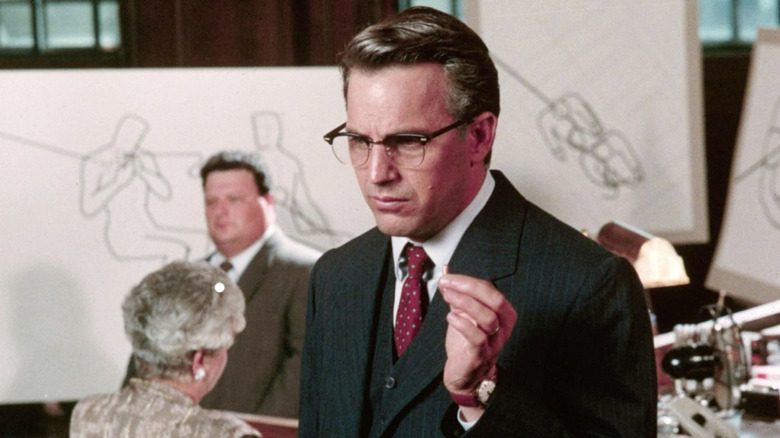The Daily Stream: Factually Accurate Or Not, JFK Is Oliver Stone's Masterpiece
(Welcome to The Daily Stream, an ongoing series in which the /Film team shares what they've been watching, why it's worth checking out, and where you can stream it.)
The Movie: "JFK"
Where You Can Stream It: HBO Max
The Pitch: Oliver Stone blows the lid off the entire Kennedy assassination conspiracy! And by that I mean he bends truths, ignores facts, and draws some illogical conclusions all while still making an absolute movie masterpiece. Plot-wise, the film follows New Orleans District Attorney Jim Garrison (Kevin Costner) and he looks into the many, many, many conspiracy theories surrounding the assassination of President John F. Kennedy. Along the way, a ridiculously stacked cast comes and goes, all while Garrison fights for the truth.
Why It's Essential Viewing
Who killed John F. Kennedy on November 22, 1963? While there was never a trial in the matter, the official consensus is that Lee Harvey Oswald pulled the trigger, and he acted entirely alone. However, conspiracy theories cropped up almost immediately following the assassination, and they've been with us ever since. It's gotten to the point where a wide swath of the country believe there was probably a conspiracy involved with the assassination. And I'm not just talking about the lunatics who believe in insane stuff like Qanon, either. Perfectly reasonable people think that Oswald did not act alone.
There's a wide variety of reasons for this. First and foremost is the fact that it's hard for many people to believe that an absolute nobody like Oswald could murder the most powerful man in the country. But another key factor in the still-raging world of conspiracy theories is Oliver Stone's 1991 film "JFK," which is celebrating its 30th anniversary this week. Stone's film was huge – it was the sixth highest-grossing film of 1991 worldwide, and it ended up leading to legislation. Specifically, the popularity of the film resulted in Congress passing the President John F. Kennedy Assassination Records Collection Act of 1992, which established the collection of all U.S. records regarding the assassination to be housed in the National Archives.
Stone's film is abundantly clear on the matter: Oswald did not act alone. In fact, Stone takes it even further, suggesting that Oswald was almost entirely innocent. There's even a deleted scene from the film where the ghost of Oswald, played by Gary Oldman, takes the stand during a trial and proclaims his innocence. In Stone's film, Oswald is just a patsy; a stooge; a fall-guy set up by a deep-reaching cabal that includes the military-industrial complex, anti-Castro guerillas, the CIA, the mafia, and even Lyndon B. Johnson, Kennedy's VP and successor.
And here's the thing: while Stone claims he can back a lot of this stuff up, his conclusions are riddled with errors. If you were to solely go by Stone's film, you'd assume that there was next to no real evidence against Oswald. That's simply not true. There was lots of evidence. In fact, one witness to the assassination even identified Oswald as the shooter – but declined to pick him out of a line-up. Why? Well, because like Stone, even that witness assumed there was a conspiracy and was afraid that if he fingered Oswald his own life would be in danger. You don't have to take my word for any of this – it's all been documented in many, many books written on the matter.
Now, I don't think Stone is being nefarious in putting forth any of his conspiracy theories. He genuinely believes them, and I really do think he wants to get to the truth. But short of some sort of miracle, we'll probably never really know the truth. However, the evidence strongly suggests Oswald was the shooter, and he acted alone. But even if you believe that, and even if you think Stone is full of it, it's hard to deny that "JFK" is something of a masterpiece. From a purely filmmaking standpoint alone, what Stone crafted here is nothing short of remarkable. The filmmaker is trying to get a lot of information across, and that means the movie mostly consists of people sitting around in rooms having long conversations. That could've been very, very boring. But Stone, working with a team of editors, finds a way to make it all sing. Backed up by constantly shifting cinematography styles courtesy of Robert Richardson, Stone weaves an often terrifying, paranoid saga of massive government conspiracies, and one brave man who tried to get to the truth.
That brave man is Jim Garrison, played by Kevin Costner. The real Garrison, a New Orleans DA, was reportedly notoriously corrupt. But in Stone's film, his the last honest man; the only person who wants to get to the truth, even when those around him – including his wife, played by Sissy Spacek – are telling him to let it go. Again: none of this is accurate. But it's okay. As "The Man Who Shot Liberty Valance" taught us, "When the legend becomes fact, print the legend." That's what Stone is doing here – printing the legend.
And even if it doesn't all add up, Stone still created something incredible. I'd even argue that "JFK" is his best movie, although others might disagree. Its contents may not be entirely factual, but there's one truth that cannot be denied: "JFK" is a great damn movie.
